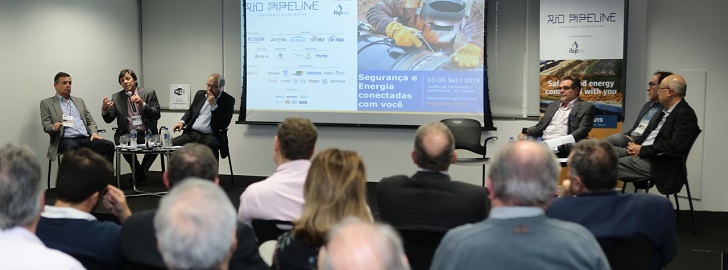In warmup event to Rio Pipeline, executives point out the challenges and opportunities of Brazilian pipeline sector

Promoted by IBP, event gathered the pipeline community and industry leaders
The Brazilian Petroleum, Gas and Biofuels Institute (IBP), started, on Tuesday (7/30), the debates that will be expanded during the Rio Pipeline 2019, the meeting point of the international pipeline community in Brazil, to be held on September 3rd to 5th, in Rio de Janeiro. The warmup event, attended by executives from the pipeline sector, highlighted issues such as the challenges and opportunities of the sector in a transition scenario in the mid and downstream segments of the country.
During the opening, Milton Costa Filho, IBP Secretary General, presented the goals and the relevance of Rio Pipeline and was thrilled. “The moment couldn’t be more auspicious, once we are facing significant changes in the market. Besides the privatizations, this opening process released the search for more competitiveness in the sector, what includes the need for team building with qualified professionals to meet the new demands that will arise. All of this, aligned with a moment of energy transition and digital transformation, makes the current scenario the best scenario for Rio Pipeline 2019”, said.
The amplification of discussions about occurrences of fuel theft and accidents resulting from clandestine bypasses is at the center of the operators’ concern. Actions to prevent this practice, reinforce the need to develop intelligence and security programs to ensure the protection of life, the environment, the energy security of the country, and the integrity of the facilities.
Therefore, thinking to hold back frequent theft of fuel in oil pipelines, Mauro Mendes, executive logistics manager at Petrobras, presented the Integrated Pipeline Protection Program (Pró-Dutos), a partnership between the state company and Transpetro. “Pró-Dutos, launched in June, aims to prevent fuel theft in the pipeline network operated by Transpetro”, he explained. “Our goal is to reduce thefts by 75% until December 2021 to minimize risks, operate safely and avoid the impacts of clandestine activities, as thefts often cause leaks of soil-contaminating products and can result in explosion, endangering society, the environment and the assets of companies”, Mendes added.
In addition to the Integrated Pipeline Protection Program, Mauro Mendes commented on the significant steps Brazil has been taking in relation to the development of the natural gas and refining and logistics markets. According to the executive, Petrobras will invest about US$ 1.4 billion in refining and US$ 370 million in logistics in the coming years. Also considering the logistics sector, Antonio Rubens, Transpetro’s president, said that the company, Petrobras’ logistic arm, has been preparing for this new moment of transition. “We are preparing to take a new step, focusing on positioning ourselves as a logistics service provider, always maintaining the excellence of our operations,” he said.
Wong Loon, NTS’s president, emphasized the importance of prioritize investments in security, which needs to be linked to a governance and compliance system. “NTS forecasts an investment around R$ 900 million in the next five years, although is looking forward to become more efficient and is preparing for future network expansion and new customer attraction”, pointed out.
According to Gustavo Labanca, TAG president, the company also intends to be prepared to act in the new gas market and to become relevant within five years. “The challenge is to bring new customers to the gas tansmission network in the country “, added.
To Wagner Biasoli, Logum president – that operates the biggest ethanol pipeline in the country – the scenario shows more promising for ethanol in the coming years, driven by RenovaBio, a policy to stimulate the expansion of biofuels. “Thus, the company organizes itself to resume the expansion of its network”, concluded.
Lastly, TBG president, Ivan de Sá, revels how the company is working in a new model of inputs and outputs. “This new model is a joint work with ANP, a considerable step to bring more dynamics to Brazilian gas market. It is an excellent opportunity to reduce unit cost, enabling greater demand for the sector”, said.
The subscriptions to Rio Pipeline Conference & Exhibition 2019 are open. The event is organized by IBP and sponsor by Rosen Group, NTS, AVEVA, Engie, TBG, Intero, Trapil, Plural + Combustível Legal, Worley and Emerson.